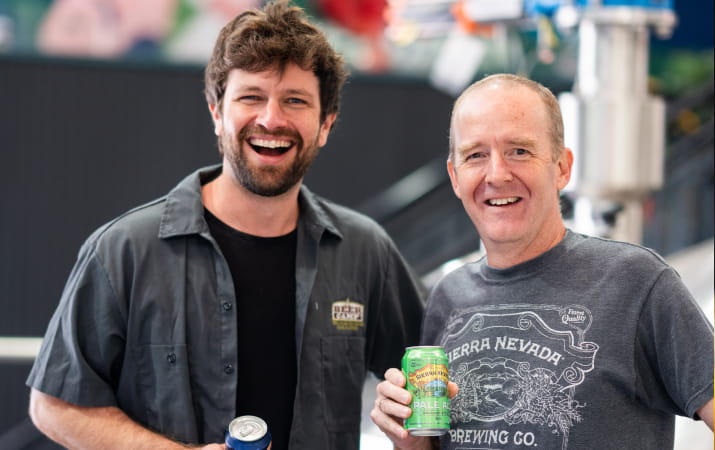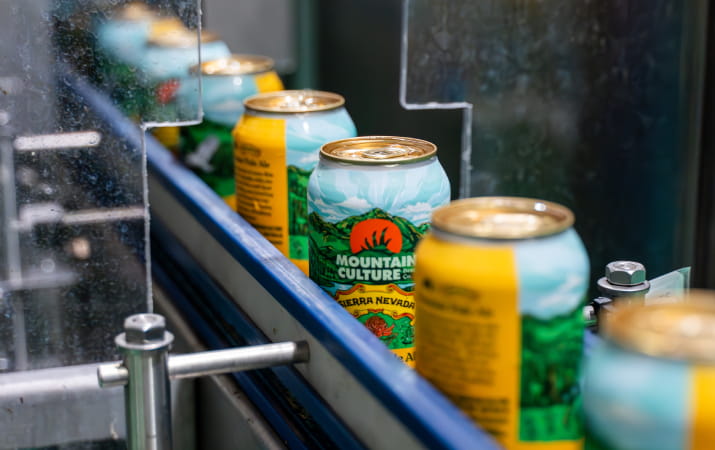How to start a career brewing beer
Accomplished brewer and business owner DJ McCready offers his roadmap for success in this sought-after field.

One of the oldest—and arguably most universally loved—drinks in the world, beer has proven a firm fixture in culture and society.
A 5,000-year-old pay stub from ancient Mesopotamia reveals that workers were paid in beer. In the Middle Ages, farmers would start their day with a ‘small’ beer (an unfiltered, low-alcohol, porridge-like brew), as it was calorie-rich and a great source of energy. And today, the beer industry generates $16 billion a year for the Australian economy, supporting more than 97,000 jobs. Between 2023 and 2027, the local beer market is projected to grow a further 4.90%.
While different styles of beer have waxed and waned in their popularity over the years, the basic principles of how to brew beer have remained the same since beer was invented. Though what we now recognise as beer looks dramatically different from the concoctions that reigned up until the eighth century CE, when hops became an essential ingredient, and the late 1700s, when the process of carbonation was invented.
Can anyone brew their own beer?
The short answer is yes, absolutely. If you’ve got $100 in your back pocket for a starter kit, and a few hours up your sleeve to put the equipment together, you could be drinking your own brand of lager, pale ale or IPA in just a couple of weeks.
The process of brewing beer from a kit is as easy as boiling water, stirring things and keeping your equipment clean. Once everything’s set up, it’s the yeast that’s doing the hard work for you.
The long answer is that while anyone can homebrew, it takes dedication, patience, and arguably a bit of a penchant for science to successfully experiment and consistently make great beer.
DJ McCready, co-founder and head brewer at Mountain Culture Beer Co in NSW’s Blue Mountains—which took out top honours in the GABS Hottest 100 in 2022 for its Status Quo pale ale—says it takes a certain kind of person to excel in the commercial beer brewing game, where the stakes are a lot higher than at home.
I definitely think there’s a certain personality type that gravitates towards making beer,” he says. “Brewers … like focusing on process. They're very detail-oriented people, and that is extremely important: it only takes one little thing to go wrong to completely spoil a batch of beer.”
The US-born brewer’s introduction to the industry started with a spell of homebrewing. “I was living in this town [Asheville, North Carolina] that kind of became known for craft beer, and the funding got cut for the program I was working for. So, I found myself without a job at 23 years old, and not a lot of money. I was living with a roommate, and we had a lot of time on our hands, so we started out [homebrewing] basically to save money.”
Soon enough, some friendly competition sparked up between them. And around the same time a new brewery opened in their neighbourhood. DJ decided to dial up the rivalry a notch.
“I thought, ‘if I go there and volunteer and sweep the floors these guys are gonna teach me about making beer and I'll beat Josh at home brewing’. So, I just annoyed the absolute hell out of this brewery until they took me on as an unpaid intern. After about three years I looked up and I was the head brewer."

How hard is it to brew your own beer?
According to DJ there’s a bit of a misconception about what brewing involves. While it’s not something that’s strictly ‘hard’ to do, and it can most certainly be a rewarding hobby and career, the realities of brewing beer might be different to what popular culture would have you imagine.
“Everybody thinks that it's this art-driven, creative place,” he says. “I used to tell everybody that I was a glorified janitor, because the job is like 80% cleaning. There's very little of it that's actually recipe formulation. It's a manufacturing environment.”
| Related: Occupational health and safety courses |
Could a beer brewing course help you get a job in a brewery?
A qualification will certainly help you gain a foothold in the job market, if that’s your aim.
While DJ succeeded in working his way up the ladder by learning on the job, he notes that things have changed since he earned his stripes as a brewer. “It's becoming more competitive to get jobs [in the industry],” he says. “As the industry progresses, I think that [education is] going to become more and more of a prerequisite.”
But ultimately, he adds, your personality and drive play a starring role in your job search too. “People who were really passionate about learning and could be good team players ended up getting the job,” DJ says of his experience with recruiting. “Having the education is an amazing starting point, but attitude and being a [good] cultural fit is always going to be king.”
If you’re serious about taking your knowledge of the subject to the next level, either because of a burning passion, or because you’re intending to pursue a career in the industry, there are a number of courses available. For example, you can complete an Undergraduate Certificate in Fermentation in as little as six months, or even an Associate Degree in Applied Science through Open Universities Australia.

Is a job as a brewer right for you?
Given the traits necessary to succeed in the field, and the typical daily routine of a brewer, a career in the industry is not for everyone, notes DJ. He likens life as a brewer to life as a chef.
“You have to be very organised,” he explains. “It's about being ready for things as opposed to being reactionary to them. So, when I see people wanting to work in the brewery that haven’t worked in the beer industry before, but they've worked in fast-paced kitchens, I'm always like, ‘cool, that’ll actually really click’.”
If you’re on the fence about changing careers, DJ recommends gaining some experience first. “See if you can do a day shadowing somebody in a professional brewery [because] it might be very different to what you think it is,” he says. “Go in with [your] eyes wide open.”
Though being a brewer is not all about sitting around and drinking freshly brewed IPAs with your mates, DJ is still a strong advocate for brewing as a career.
“It's an awesome industry to get into,” he explains. “It’s really fun [and] it attracts amazing people. I love the fact that there's always new things to learn about brewing: new technology, new ingredients, new ways of doing things. You can never really ‘be done’ with your knowledge base. It's definitely a cool job.”
Learn the science behind beer by studying fermentation online through Open Universities Australia. Or discover other chemistry, business and health and safety courses that could boost your knowledge for the beer industry.
Get personalised advice about online study
A student advisor will call you at your preferred time to answer your questions.



